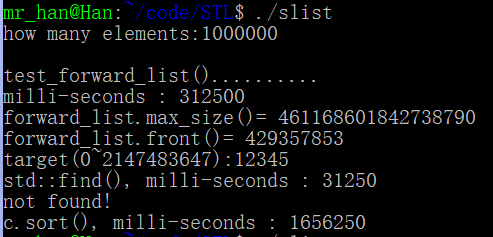容器之分类与各种测试(三)——slist的用法
slist和forward_list的不同之处在于其所在的库
使用slist需要包含
#include<ext\list>
而使用forward_list则需要包含
#include<forward_list>
剩余两者调用的API基本相同
例程
#include<stdexcept>
#include<string>
#include<cstdlib>
#include<cstdio>
#include<algorithm>
#include<iostream>
#include<ctime>
#include<ext\list>
using namespace std;
long get_a_target_long()
{
long target = 0;
cout<<"target(0~"<<RAND_MAX<<"):";
cin>>target;
return target;
}
string get_a_target_string()
{
long target = 0;
char buf[10];
cout<<"target(0~"<<RAND_MAX<<"):";
cin>>target;
snprintf(buf, 10, "%ld", target);
return string(buf);
}
int compareLongs(const void* a, const void* b)
{
return (*(long*)a - *(long*)b);
}
int compareStrings(const void *a, const void *b)
{
if(*(string*)a > *(string*)b)
return 1;
else if(*(string*)a < *(string*)b)
return -1;
else
return 0;
}
void test_slist(long& value)
{
cout << "\ntest_slist().......... \n";
_gun_cxx::slist<string> c;
char buf[10];
clock_t timeStart = clock();
for(long i=0; i< value; ++i)
{
try
{
snprintf(buf, 10, "%d", rand());
c.push_front(string(buf)); //由于效率原因,forward_list不提供push_back方法
}
catch(exception& p)
{
cout << "i=" << i << " " << p.what() << endl;
abort();
}
}
cout << "milli-seconds : " << (clock()-timeStart) << endl;
cout << "slist.max_size()= " << c.max_size() << endl; //536870911
cout << "slist.front()= " << c.front() << endl;
string target = get_a_target_string();
timeStart = clock();
auto pItem = find(c.begin(), c.end(), target);
cout << "std::find(), milli-seconds : " << (clock()-timeStart) << endl;
if (pItem != c.end())
cout << "found, " << *pItem << endl;
else
cout << "not found! " << endl;
timeStart = clock();
c.sort();
cout << "c.sort(), milli-seconds : " << (clock()-timeStart) << endl;
c.clear();
}
int main()
{
long int value;
cout<<"how many elements:";
cin>>value;
test_slist(value);
return 0;
}
运行一下

与forward_list无异
不积小流无以成江河




